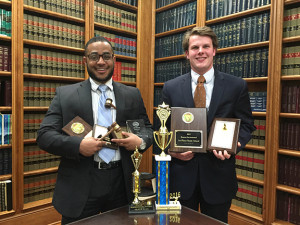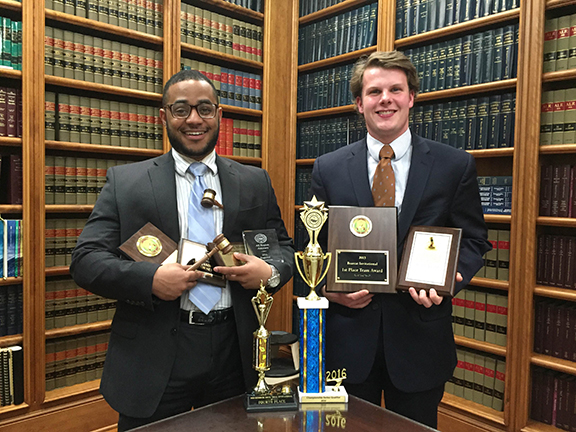By DENISE ELAM
Reporter
(WARRENSBURG, Mo., digitalBURG) — One of the two mock trial teams at the University of Central Missouri will compete in the American Mock Trial Association Opening Round Championships in St. Paul, Minnesota, on March 11-13.

PHOTO BY DENISE ELAM / REPORTER
The advancing mock trial team co-captains Broderick Hayes (left) and David Rogers hold the awards they have won individually and as a team during the 2015-2016 mock trial season.
The team earned a bid to compete in the ORCS after placing fourth overall at the AMTA Regional Tournament at the University of Missouri-Kansas City. UCM went up against teams from Macalester College, Central College, University of Missouri- Kansas City and University of Missouri- Columbia.
“At the regional competition we were 6-2, which is very good,” said Adam Sommer, a practicing attorney in Warrensburg and coach of the team for three seasons.
Sommer said mock trials are academic competitions between two teams from different universities. He said each team gets a case packet with the same information to prepare both sides of the case before the trial.
“They find out before the round which side they’re going to represent,” he said. “From there, they compete directly with two judges in the room scoring them. Each judge’s ballot is worth a possible 140 points. Based on your score, you are given a win, lose, or a tie. A win is worth one, a loss is zero, a tie is (half a point).”
At each tournament there are two rounds of prosecution and two rounds of defense. In the end, the highest score a team can receive is 8-0. The worst is 0-8.
“The worst that our A Team did this year was 5.5-2.5,” Sommer said of the team advancing to the ORCS. “Their best record was 8-0.”
Sommer attended law school at the University of Missouri-Columbia, so he said there is a certain satisfaction in beating MU at tournaments.
“Kids at MU don’t know we exist at UCM,” he said. “And then they do. And then they don’t forget us.”
David Rogers, co-captain of the team, said a lot of the universities the teams compete against have law schools so they have the resources, law professors and the attorney’s mindset already.
“UCM is unique in that we’re one of the schools that doesn’t have a law school and we still sweep competition like none other,” Rogers said.
Rogers said the best part about being on the team is that it develops those participating into better people by teaching them how to speak and support their words, how to dress and how to remain calm.
“It’s a high competitive environment, which just makes us even better,” Rogers said.
Broderick Hayes, the team’s other co-captain, said being competitive during mock trials helps build analytical skills and helps those participating understand not only what they’re doing but also why it’s important and how to properly do it.
“One of the benefits I’ve seen from joining the team is that I have a lot of access to resources that people who aren’t a part of the team don’t have access to,” Hayes said. “One of those things is the coach, Adam Sommer, who is an actual practicing attorney in Warrensburg.”
Hayes said the team meets once a week, typically on Thursdays, to prepare.
“You read and review the case packet or the case problem that the AMTA writes for you,” he said. “It takes about three hours and you typically do it twice before you ever even sit down and work with your team and kind of diagnose and brain storm what the theories of the case will be and what type of witnesses you want to call for the case.”
Rogers said it takes around 12 to 15 hours a week aside from the weekly meetings to fully prepare for tournaments. Competitors can be either a witness or an attorney. They prepare for both.
“As an attorney what I do is I read over the rules of evidence,” Rogers said. “I read over the case law, the stipulations, and then work with my witnesses that I direct to kind of get the information out that we need for the case. And then also prepare cross examinations of the witnesses for the teams that we compete against to draw in information that we need for that side of the case.”
To prepare to be a witness, Rogers said he works with his attorney to get an idea of what information needs to be communicated.
“I also come up with clever responses for what the opposing team is going to ask questions on for cross examination,” he said.
At each tournament, awards for outstanding attorneys and witnesses are given to top competitors. So far this competitive season, UCM’s mock trial teams have earned 12 outstanding attorney awards and six outstanding witness awards.
Rogers said students who have an interest in attending law school should be on the mock trial team.
“Mock trial has allowed me to go leaps and bounds on my ability to speak publicly but also be prepared for the workforce,” he said. “So if there’s a student out there that wants to go to law school or do anything in the legal profession then they need to be on the mock trial team.”
Sommer said the teams are open to all majors, but those who are interested in being attorneys have to audition. He said it takes time and regular participation to stand out. He makes it very clear to the teams from day one that there is an expectation to meet and he said he sets it high, no matter their experience or skill level.
“If there is anything on this campus that embodies the ideals of high impact learning any more than mock trial I would be hard pressed to find it,” he said. “We practice in a courtroom two to three times a year. We are judged by attorneys and judges and law students.”
Sommer said the most rewarding part about being coach is being able to give back to something that made him who he is today.
“Ten years ago I was a student and … I can tell you first and foremost the thing that propelled me to success was mock trial at UCM,” he said. “It’s my goal to create that environment again and make it even bigger – make more students capable of jumping off from UCM to…wherever they want to go.”
To keep up with the team as they compete in the ORCS in St. Paul, Minnesota, visit their blog at ucmmocktrial.blogspot.com.



Leave a Reply